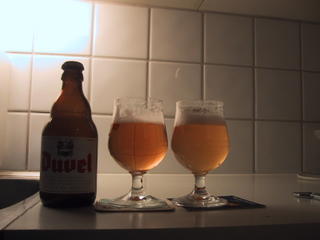Saturday, September 17, 2005
Belgian Beer: Old Duvel versus Young Duvel: The Mellowing of a Devilish Beer
 The beer shop Dorstvlegel in Antwerpen came across a crate of old Duvels, and I managed to secure one of these bottles with best before date 08-2006, so bottled three years before in August 2003. Today I popped into the Norwegian state liquor store that also sells Duvel, with a alcohol content of 8.5% by volume it cannot be sold in ordinary shops, picking up a bottle with best before date 04-2008.
The beer shop Dorstvlegel in Antwerpen came across a crate of old Duvels, and I managed to secure one of these bottles with best before date 08-2006, so bottled three years before in August 2003. Today I popped into the Norwegian state liquor store that also sells Duvel, with a alcohol content of 8.5% by volume it cannot be sold in ordinary shops, picking up a bottle with best before date 04-2008.So less than 20 months distinguish the two bottles, but the difference is noticeable already in the appearance. This is definitely not going to be a blind-tasting- you will have to lose more senses than just the vision to spot the difference.
The "old" Duvel's head was significantly less than the famous head associated with a fresh Duvel. Whereas the young Duvel is hazy straw-yellow, the old Duvel clearer and somewhat darker, maybe with a slight reddish hue. The picture above may be poor quality- is it cursed by some devilish forces, I wonder- but the "old" Duvel is the one closer to to the bottle.
The Duvel aroma is a famously mixing yeastiness with the spicy Saaz aroma. Yeastiness has developed into sun-dried fruits and the hop spiciness is gone 20 months on. The old Duvel has that aged aroma that I have come to know so well from many nights at the Antwerpen beer café Kulminator, the world's most famous aged beer bar.
The young Duvel is famously spritzy, the sweet maltiness is balanced by good bitterness, and the finishing mouthfeel is dry. The old Duvel is softer and seemingly less bitter. After enjoying the nutty and raisiny flavours the finish is still dry, though.
Duvel is not an obvious choice for aging, since so much of its character derives from its spritziness and noble hop aroma, that will no longer be prominent in an aged bottle. This tasting convinced me that even what the Flemish call "hoogblonde" (high blond) beers can develop interestingly with time. So enjoy your blonds now if you like- but they don't become less complex with age.
